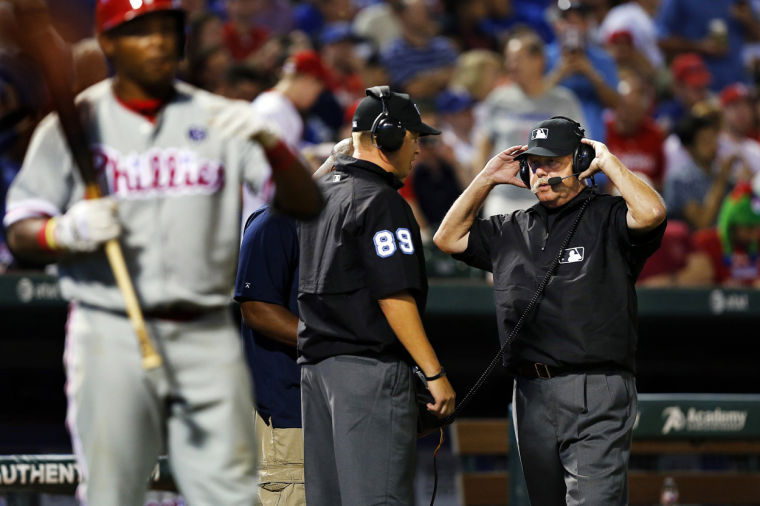Nothing instant about MLB replay
Umpire crew chief Jim Joyce dons a headset to discuss a replay during a game between the Philadelphia Phillies and the Texas Rangers at Globe Life Park in Arlington, Texas, April 1.
April 9, 2014
I spent far too many minutes last week watching Mike Scioscia and Bob Melvin chewing their gum on the baseball diamond deciding if they wanted to challenge a call or not.
They’d slowly walk out of the dugout and go stand by the umpire saying apparently nothing while their assistants would go and watch the replay.
This isn’t the NFL. There are no “full timeouts” in baseball. Sure, a batter can call for time, or a catcher or manager can go have a brief conversation with a pitcher, but that’s about it.
Managers shouldn’t be allowed to simply go stand on the field and wait while their assistants decide whether or not a play is worthy of a challenge. It is a total and complete waste of time.
I don’t like manager challenges in baseball because it breaks away from one of the most important things the game has going for it—tradition. Now, instead of seeing Lou Piniella sprint out of the dug-out after a bad call, spit in the umpires face, kick some dirt on him, and throw first base down the right field line, we see managers calmly walk out onto the field and simply state their desire to challenge the call.
Then there’s the fact that managers can only challenge a call in the first six innings. If they get it right they get another, but it is still limited to the first six innings. This makes absolutely no sense. If the point of manager challenges is to make sure the call on the field is right, then why are they limited to just the first six innings?
Baseball is basically saying, “We want to get the calls right early in the game, but in the final three innings it’s not as important, so we’re not going to allow challenges when the game is on the line.”
There is also the fact that not all calls can be challenged. Among them is what MLB considers, “subjective calls,” or ones that the umpire has to use his expert judgment on, such as balls and strikes, the infield fly rule or tag ups, etc. These are the calls that are most often missed, and most often the most controversial, but they cannot be challenged.
On top of that, it is extremely hard to overturn a call. Umpires can confirm a call, say that it stands or overturn it. Baseball plays happen at the snap of a finger, and umpires are right on top of it. There isn’t going to be much on the replay that they didn’t see on the field in the first place, making video evidence inconclusive.
I’m all for getting the calls right, but it is impossible to get every single call right. According to a ROOT Sports telecast last Sunday, 18 percent of strikes are called balls in a game. Even if baseball allowed balls and strikes to be challenged, managers would still be limited to one or two challenges a game. Say there are 200 pitches thrown in a game (a low number, but an easy one). If a manager got one or two calls overturned, there would still be missed calls out on the field, with nothing to hold the umpire accountable.
Instant replay, if anything, should only be available to use at the umpires discretion. Most of the time umpires are able to make a call a split second after a play happens, and most of the time it is the correct call. Instant replay should simply be used as a tool if an umpire isn’t sure what the correct call is.









